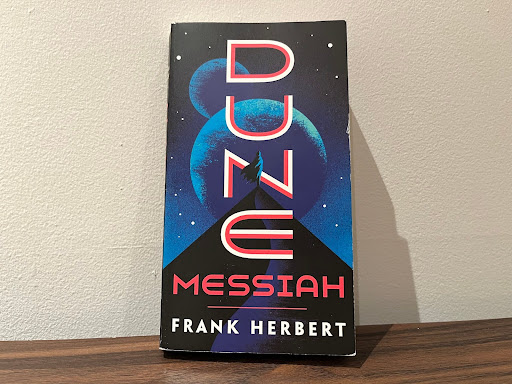
After “Dune: Part Two’s’” huge opening weekend and passing the $500 million needed to break even, a third and final part of Denis Villenuve’s space epic has been confirmed to be in development. Villenuve’s next step in telling the story of Paul Atreides would be adapting the sequel: “Dune: Messiah,” which is where the sci-fi series begins to become muddled for some.
What Frank Herbert set out to accomplish with the ironically titled “Dune: Messiah” is to explain what so many misunderstood in his first book: Paul Atreides is not the savior of this story.
Herbert completely threw subtlety away in “Messiah,” opting to strengthen the first book’s themes of the dangers in messianic figures and blind faith mostly through his layered, morally gray characters.
At the end of the first “Dune” novel, under the name Muad’dib, Paul and his Fremen freedom fighters take back the planet Arrakis, defeating the Harkonnen forces. Paul then kills the last surviving Harkonnen, Feyd Rautha, in a duel and ultimately usurps the throne, becoming Emperor of the known universe.
In the opening pages of “Dune: Messiah,” Herbert states that in the 12 years since Paul became Emperor, he has waged an unending jihad against the rest of the universe; the death toll is later revealed to be 61 billion killed in the name of Muad’dib. In this first chapter, a tight-knit conspiracy against the Emperor is revealed and the story begins.
Unlike the vengeance-fueled battles and coming-of-age trials in the first installment, “Messiah” is a full-blown political thriller that acts as a somber epilogue to the story of Paul Atreides. The pages are full of hushed conversations between new and old characters with massive implications, and this complete tonal shift works.
The dialogue is riveting with every situation holding so much at stake and no one can be trusted with every character gunning for their agenda. With a 12-year time jump, our familiar characters are obviously in different places but all being natural progressions, especially our protagonist and his family.
After a decade of being Emperor, Paul is missing the vigor he had in the previous novel. He is more pensive, spending most of his time walking around the city of Arrakeen wondering if what he’s done is justified and contemplating if he could even stop this war if he tried. His outlet of this frustration lies in the relationship with the women in his life; his concubine Chani and his now teenage sister Alia.
Paul’s true love Chani is significantly different than her depiction in the Villeneuve films. Instead of being the strong, free-thinking warrior who opposes the prophecy she thinks enslaves her people, she is a believer in Muad’dib— and a pretty one-dimensional character. This is one of the biggest pitfalls of Herbert’s books, such an integral character is underdeveloped as just being Paul’s lover, and her potential is wasted.
Unlike Chani, “Messiah” realizes Alia’s potential shown in the first novel. “St. Alia Atreides of the Knife” has grown from a terrifying, omnipotent toddler into a reckless religious deity that is worshiped as much as her brother. Paul even acknowledges her as a “goddess,” making her future as this holy figure even more scary. This character seems to be in perfect hands with Anya Taylor-Joy being cast as Alia. Most of her chapters show her odd relationship and attraction to another character: Duncan Idaho.
Fans of the film know Jason Momoa as the ever-loyal Duncan but those same fans know that he heroically sacrificed himself, his fate is the same in the book so things get strange here.
It’s revealed in the first chapter that Duncan’s resurrection as the “ghola” now named Hayt at the hands of the Bene Tleilax is a fundamental part of the conspiracy against Paul.
Yes, that was a lot of sci-fi jargon and yes, resurrection is an annoying trope in sci-fi that usually cheats the audience out of any actual emotional attachment to a character. But in this novel, Frank Herbert somehow makes this tired trope into a tender evolution for a fan favorite.
The stranger side of this universe with gholas— face dancers and guild navigators introduced by Duncan and the Tleilax— can be overwhelming but the payoff is worth it. Compared to where the series eventually takes Duncan and these aspects, this is actually tame.
Many fans of the original novel are turned off by the slower pace and more political turn that “Dune: Messiah” takes but this just adds to the novel’s legacy. At its core, “Messiah” is a fantastic progression of “Dune’s” themes and ideals. At only 336 pages, it provides an easy read and a satisfying end to Paul Muad’dib Atreides for any impatient fans of the film series.
Denis Villeneuve will have his work cut out for adapting this novel but considering how clear his vision for the first book was, “Dune: Messiah” will certainly be respected and turned into the great film it deserves.








